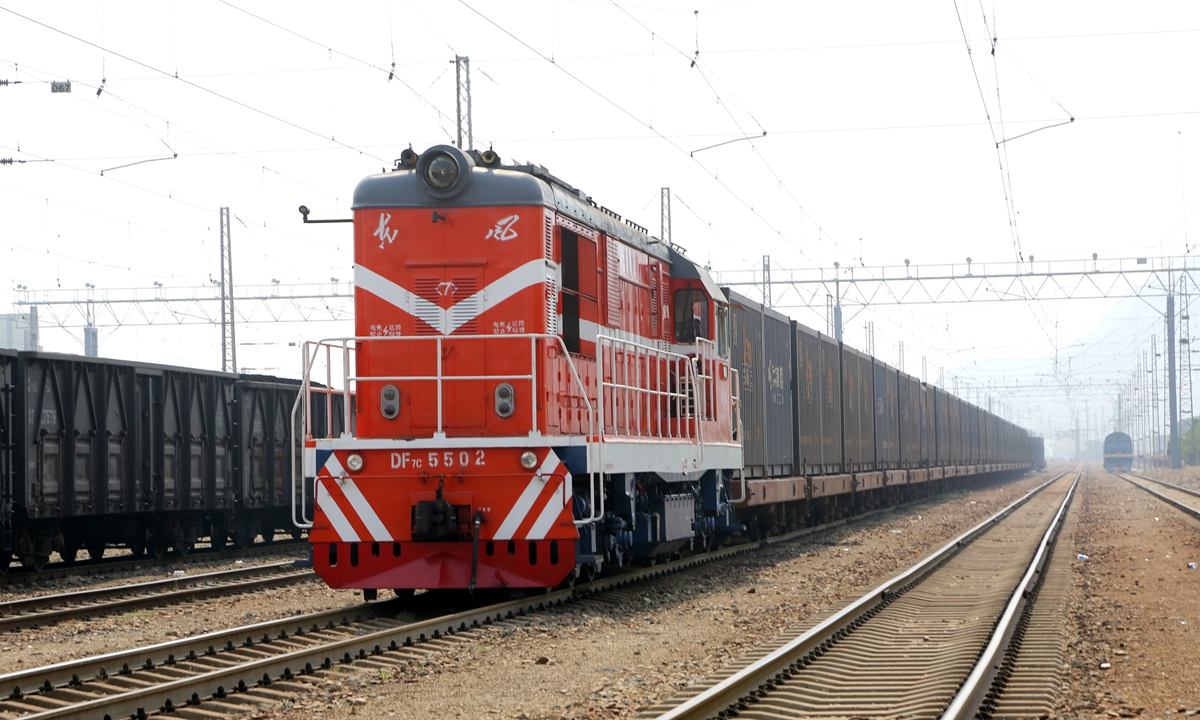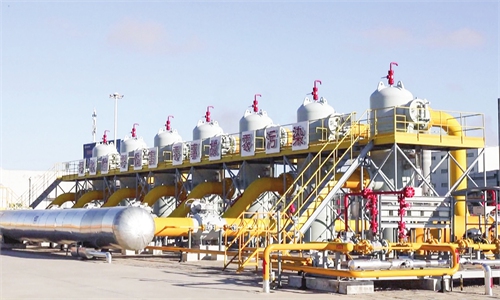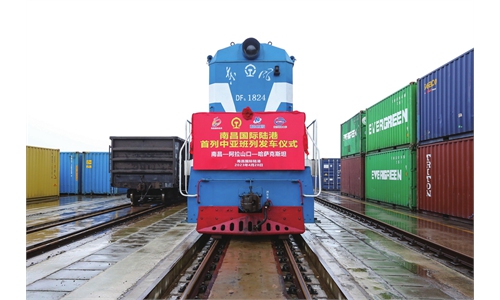China-Central Asia to facilitate new railway, road facilities expansion and upgrade, a boost to regional trade, prosperity
New railway, road facilities to boost regional trade, prosperity, unlike US' empty rhetoric: experts

A train heading for Central Asia is seen at Lianyungang, East China's Jiangsu Province on Tuesday. In May, China-Europe trains originating from Lianyungang saw a year-on-year increase of 13.98 percent. Photo: cnsphoto
China and Tajikistan said in a joint statement issued on Thursday on the sideline of the China-Central Asia Summit that both sides will continue to work hard to promote the construction of railway and highway transportation corridors, while emphasizing the great significance of strengthening connectivity of the regional transportation infrastructure.
The latest efforts by the two countries on the joint development of transportation, key to economic prosperity, are meant to boost regional trade flows, create jobs, stabilize and secure supply chains while facilitating the China-Central Asia-West Asia Economic Corridor linking China and the Arabian Peninsula, experts said. Such cooperation is all based on win-win outcomes for regional prosperity in stark contrast with the political purposes of the US.
Transportation, the foundation for development, was highlighted during the summit, mirroring the willingness to deepen connectivity between China and the Central Asian countries, in which both sides are highly complementary in trade.
The Chinese side has taken note of Tajikistan's proposals on advancing the modernization of the China-Tajikistan-Uzbekistan highway and fully utilizing the potential of the Kulob logistics center in southern Tajikistan to develop the multimodal transport corridor linking China, Tajikistan, Uzbekistan, Turkmenistan, Iran and Turkey.
The two sides highlighted the great significance of the construction of the China-Tajikistan-Northern Afghanistan Economic and Transportation Corridor while emphasizing the importance of keeping the Karasu-Kulma Pass smooth and uninterrupted throughout the year.
The statement came just a day after a joint statement between China and Kazakhstan on Wednesday, in which future cooperation for transport networks was highlighted.
China and Kazakhstan are willing to improve the level of connectivity, improve cross-border cargo transportation and port cargo delivery capabilities, deepen practical cooperation regarding the China-Europe Railway Express and the Trans-Caspian Sea International Transport Corridor, and promote land-sea combined transport.
The two sides agreed to promote transportation cooperation to stabilize production and supply chains, while actively exploring and studying the possibility of a third cross-border railway and the addition of railway ports.
Experts and traders expect the greater transport connectivity, especially in railway lines, to play an increasingly important role in connecting the East and the West.
The joint construction of the China-proposed Belt and Road Initiative (BRI) focuses on the interconnection of infrastructure, so building new railways will promote regional interconnection, especially in logistics, economic and trade development, Liu Zongyi, secretary-general of the Research Center for China-South Asia Cooperation at the Shanghai Institutes for International Studies, told the Global Times on Thursday.
Home appliances, furniture and daily commodities are Chinese-made products that are gaining rising popularity in the Central Asian countries, the Global Times learned from industry insiders.
Agricultural products such as wheat and dairy, and bulk commodities like copper, are highly demanded in the Chinese market.
Experts said that the current railway lines and roads are inadequate for booming trade flows, and regional transport facilities need to be expanded and upgraded.
Liu Huayan, a manager of Xinjiang Hongyunda Freight International Co, told the Global Times on Thursday that the company is excited about the future launch of more railway lines.
"Currently, the two railways between China and Kazakhstan are cross-border railways via Alashankou and Horgos. These two routes are sometimes quite congested. If the third route is opened, it will definitely relieve the pressure," Liu said.
Other rail lines such as the China-Kyrgyzstan-Uzbekistan railway, which has been developing for 26 years since it was first proposed, also gained attention amid the summit.
In a joint statement by China and Kyrgyzstan on Thursday, the China-Kyrgyzstan-Uzbekistan railway project was highlighted for its historic significance for strengthening the connectivity between the two countries and the region.
China and Kyrgyzstan are satisfied with the completion of the feasibility study of the railway project and are willing to jointly promote the follow-up work and prepare for the start of construction, the statement said.
Different from road transport, railway service enables more scheduled delivery services for traders. The wide categories of goods that can be carried by trains and the long distance delivery also add advantages for train service.
Railway lines can unleash more trade potential when it comes to extending connectivity with the Middle East, Turkey, and even to southeast and central and southern Europe, Zhang Ning, an expert with the Institute of Russian, Eastern European & Central Asian Studies of the Chinese Academy of Social Sciences, told the Global Times on Thursday.
Many of the railways in Central Asian countries were built in the Soviet era, and they are wide gauge, which is different from the Chinese standard, Liu Zongyi said.
Experts said that strengthened connectivity between China and Central Asia sets an example and brings tangible benefits that cannot be ignored, unlike the West and the US seeking regional influence, or trying to sow discord to undermine China-Russia, China-Central Asia relations.
The railway infrastructure cooperation serves a microcosm of practical cooperation between China and Central Asia, which actively promotes the economic, social and economic development of Central Asian countries and promotes prosperity, Liu Zongyi said.
"This is completely different from the 'empty promises' by the US in the region, which often come with political intervention, " Liu said.



